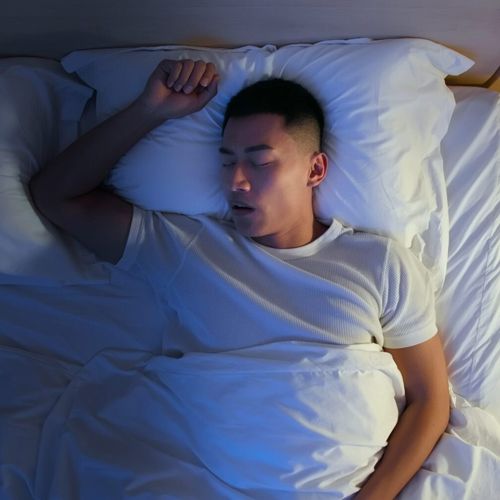Snoring treatment
Things you may not know about Snoring
There are many snorers in the world. Adults snore on occasion—a staggering 50% of them. Snoring is a bad habit that, at best, wakes up your sleeping partner. Snoring is an indication of sleep apnea, a very serious medical condition, though.
Poor upper airway structure is the root cause of the regular, loud noise that snorers generate while they sleep. When inspired air is forced through relaxed throat tissues, it causes snoring, a frequent, loud, and annoying sound.
Sometimes, snoring is merely a nuisance to people around you. Additionally, snoring could be a sign of the more dangerous medical condition obstructive sleep apnea. Nearly 37 million adults in the US snore loudly on a regular basis, according to the National Sleep Foundation. Make an appointment to speak with our snoring doctor Visit us at Sleep Advantage in Arlington WA. We can perform an assessment and find the right treatment for your snoring.
Typically, snoring indicates that the tissues in the back of the throat are becoming loose. As the airway narrows, the snoring becomes louder. This happens as a result of the extra floppy tissues' increased airflow resistance. Sometimes, nasal fractures, nasal turbinate hypertrophy, or a deviated septum can all contribute to snoring. Snoring symptoms that are related to sleep-disordered breathing include nasal obstruction, dry mouth, sore throat, and restless sleep.
Snoring is not dangerous, but if you have any of the associated symptoms, such as excessive daytime sleepiness, gasping or choking at night, high blood pressure, uncontrolled weight gain, or chest pain, a screening home sleep study (polysomnogram) is indicated.
What are the signs of snoring?
Ah, the melody of snoring—the roaring rumble: Is there a thunderous rumble echoing through your bedroom at night? If you or someone else sounds like a grizzly bear in slumber, it's a classic sign of snoring and a familiar nighttime tune for some! But if you or your loved ones are wondering whether snoring is becoming a bit too loud or frequent, let's uncover some exciting signs that might indicate it's time to pay attention to the nighttime symphony:
- Sleepy Serenade: If you wake up feeling tired, even after a full night's rest.
- Bed Partner Complaints: Your bed partner may not be too thrilled with your symphony and could be robbing you of the deep, restorative sleep you need. If they mention that your snoring is louder than a drum set, it might be time to take notice.
- Pauses in Breathing: Snoring sometimes comes with a surprise twist. Pauses in breathing during sleep If you or your partner notice moments where breathing stops and starts, it could be a sign of sleep apnea.
- Gasping for Air: Witnessing your partner gasping for air or choking during sleep can be distressing. It's a signal that the snoring is more than just a lighthearted melody.
Dry Mouth or Sore Throat: Snoring can dry out your mouth or throat, leaving you feeling parched or with morning soreness as if you've sung karaoke all night. - Positions: Have you noticed that the volume of the snore symphony changes when you sleep on your back? Snoring might be more prominent in this position due to the tongue and soft tissues relaxing and partially blocking the airway.
- Daytime Sleepiness:
If your days feel like a sleepwalk, with constant yawning and difficulty staying awake, it could be linked to snoring affecting your sleep quality.
- Morning Headaches:
Waking up with a headache could be a sign that snoring is causing disruptions in your sleep and affecting your oxygen levels.
- Social Snoring Stories: If your friends or family members share amusing tales of your nighttime concert, it might be time to consider whether your snoring is becoming a regular occurrence.
If you or your partner notice any of these signs, don't worry! It's essential to pay attention to your sleep health. Seeking guidance from a healthcare professional, such as a sleep specialist, can help identify the cause of the snoring and explore suitable solutions for a quieter and more restful night's sleep.
So, embrace the signs, and let's embark on the journey to a peaceful night's sleep—with no snoring solos! Sleep tight!
How is snoring identified?
The questions our healthcare provider will ask you include how often you snore, what it sounds like, and how your diet and lifestyle affect your ability to sleep, among other things. During an examination, our doctor will measure your blood pressure, listen to your heart, and check your mouth, nose, and throat.
To evaluate your sleeping patterns, our doctor may ask for a sleep study (polysomnogram). You might need to spend the night in a sleep lab, or you could complete the sleep study at home. A sleep study evaluates:
Brainwave patterns
- An explanation of your breathing patterns, mentioning any pauses or gasps for air.
- Oxygen flows through the heart.
- During sleep, arm and leg movements as well as tossing and turning might be observed.
- Sleeping spells and snoring.
- This will aid in providing snoring treatment in Arlington WA.
What non-surgical treatments are available for snoring?
Your doctor might suggest specific treatments to improve your posture or open up your airways while you're sleeping. The following are solutions for snoring:
- Adjusting your lifestyle can help you stop snoring. These include avoiding alcohol before bed, changing your sleeping position, and maintaining a healthy weight.
- Medication: Cold and allergy medications relieve breathing difficulties by clearing nasal congestion.
- Nasal strips: These thin, flexible bands keep your nasal passages open by adhering to the outside of your nose.
- Oral appliances: Using an oral appliance while you sleep will keep your jaw in the proper position, allowing air to flow. Your doctor can refer to it as a mouthguard or a device. A mouth guard worn for another activity, such as sports, won't prevent snoring.
How soon after I notice I'm snoring should I see a doctor?
Snoring may cause health problems. Getting a diagnosis and talking to your doctor about snoring prevention are essential. Make a doctor's appointment right away if you experience difficulty breathing while you sleep or are continually worn out during the day.
Snoring could be an indication of sleep apnea, though it's not a guarantee. Sleep apnea is a sleep disorder that makes it difficult to breathe while you're asleep. Gasping during sleep, pausing in regular breathing, headaches upon waking, feeling sluggish and groggy during the day, and, perhaps most infamously, loud snoring that could keep your bed partner awake are all signs of sleep apnea.


